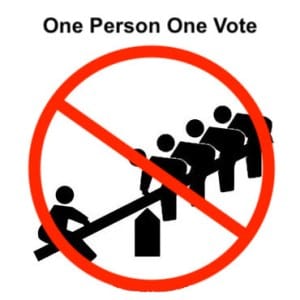Bill that would regulate Indiana voting systems to ensure one-person-one-vote not seen as essential this session

As the Indiana General Assembly passes its halfway mark, several bills have not met their required milestones to get further consideration.
 One of them was HB 1288, which deals with election security. It was sponsored by Representative Ryan Lauer, a Republican whose District 59 covers most of Bartholomew County, including the city of Columbus.
One of them was HB 1288, which deals with election security. It was sponsored by Representative Ryan Lauer, a Republican whose District 59 covers most of Bartholomew County, including the city of Columbus.
The bill got a mention at an early-February meeting of Monroe County’s election board, as part of county clerk Nicole Browne’s rundown of pending legislation. It got a second look, because of its requirement that voting systems store votes “as a whole number, without the use of decimals or fractions.”
Browne told her two colleagues on the three-person board: “I don’t want anybody to be alarmed in Monroe County. We have never reported out our votes in anything but whole numbers.” Browne ventured, “So something’s going on in some other county. And I would not take that as a fire alarm in Monroe County.”
According to Lauer, the motivation behind the bill was not based on an attested problem with vote total reporting in any of Indiana’s counties.
The bill’s prohibition of fractions in voting number storage works in concert with another requirement of the bill, which says that a voting system must not include a weighted vote feature.
The bill also says that the results from any automatic tabulating machine may be tabulated only within the state of Indiana, and that election results have to be published to the public, before they are transmitted outside Indiana.
Lauer told The Square Beacon he’d seen reports of some automated voting systems having a weighted voting feature. Lauer could not imagine why a weighted voting feature might be needed for a municipal or state election. He’d been told that weighted votes might be useful for tallying votes for a homeowners association, where votes might be weighted by the amount of property someone owns.
So Lauer wanted to check into whether any counties in Indiana used automated voting systems that include a weighted voting feature. He also wanted to know whether the status of that feature during the election tally could be audited to verify it was not turned on.
Lauer studied math and chemistry as an undergrad at Indiana University in Bloomington. He told The Square Beacon that his current work, as a technical specialist at Cummins, mostly involves software systems.
Lauer said he reached out to Indiana’s secretary of state and to VSTOP (Voting System Technical Oversight Program) for help to dig into the question: Do any Indiana counties use voting systems that have weighted vote features?
What Lauer and state election officials found was that some election systems that were potentially being used in Indiana counties, and which Lauer had flagged as possibly including a weighted vote feature, had been upgraded in a way that allayed his concern.
Lauer told The Square Beacon that he did not push the bill forward this session, partly because legislators were asked to be especially judicious with time this session, in light of the impact of the pandemic on their proceedings.
Lauer also said he was satisfied with the outcome of his investigation. Still, he called the proposal a “principled bill” that affirms “our expectation and our constitutional right, that our vote counts the same as anyone else’s—that one vote is one vote.”
Lauer continued, “I think it’s always important to scrutinize, and it’s perfectly reasonable to ask about our elections. I think Indiana does a really great job of that and I was satisfied with my investigation.”
Lauer added, “But I’ll keep looking. I want to make sure that the principle of one-person-one-vote is not only the case—which in Indiana I firmly believe it is—but also that the electorate, the people, have trust in our system.”




Comments ()